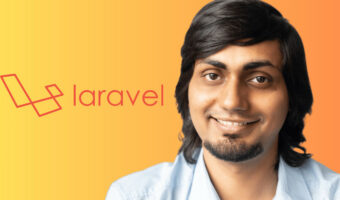Laravel Framework: Building Modern PHP Applications
About This Course
The course “Laravel Framework: Building Modern PHP Applications” provides an in-depth exploration of Laravel, a popular PHP framework known for its elegant syntax, robust features, and modern development practices. In this course, you will learn how to leverage the power of Laravel to build modern and scalable PHP applications.
The course starts by introducing you to the Laravel framework and its core concepts. You will learn how to set up a Laravel development environment, including installing Laravel and configuring the necessary dependencies. You will also become familiar with Laravel’s project structure and key components.
As the course progresses, you will dive into various topics related to building modern PHP applications with Laravel. You will learn how to use Laravel’s powerful routing system to define routes, handle HTTP requests, and create RESTful APIs. You will discover how to work with Laravel’s Eloquent ORM for database interactions, including creating models, querying data, and defining relationships between database tables.
The course also covers Laravel’s robust authentication and authorization features, allowing you to implement user registration, login, and access control in your applications. You will explore Laravel’s built-in support for handling form validation, managing user sessions, and implementing password resets.
Additionally, the course delves into advanced topics such as working with Laravel’s Blade templating engine, which provides a clean and expressive syntax for creating dynamic views. You will learn how to leverage Blade’s features to build reusable templates, handle conditional rendering, and work with template inheritance.
Furthermore, you will explore Laravel’s support for handling file uploads, managing dependencies with Composer, and implementing caching to optimize application performance. The course will also introduce you to Laravel’s testing capabilities, allowing you to write unit tests and ensure the stability and reliability of your codebase.
Throughout the course, you will work on hands-on projects and exercises that simulate real-world scenarios, enabling you to apply the concepts and techniques you have learned. By the end of the course, you will have a solid understanding of Laravel and its ecosystem, equipping you with the skills to build modern, scalable, and maintainable PHP applications using the Laravel framework.
Learning Objectives
This course is best for:
- PHP Developers: If you are a PHP developer looking to enhance your skills and learn a modern PHP framework, this course is perfect for you. It will provide you with a comprehensive understanding of Laravel and its best practices for building modern PHP applications.
- Web Developers: If you have experience in web development and want to expand your skill set to include PHP and Laravel, this course will help you transition smoothly. It covers all the necessary concepts and techniques required to build modern web applications using Laravel.
- Beginner PHP Programmers: If you are new to PHP programming and want to start with a powerful and widely used framework, this course will introduce you to Laravel and guide you through the process of building modern PHP applications step by step.
- Aspiring Full-Stack Developers: If you have a goal of becoming a full-stack developer and want to learn both front-end and back-end development, this course will provide you with the necessary skills to build dynamic and database-driven applications using Laravel.
- Self-taught Programmers: If you have been learning PHP on your own and want to learn a popular framework to enhance your development skills, this course will give you a structured learning path and teach you how to leverage Laravel effectively.
- Students and Learners: If you are a student studying web development or computer science and want to gain practical experience in building modern PHP applications, this course will supplement your theoretical knowledge with hands-on skills.
- It is recommended to have a basic understanding of PHP programming and web development concepts such as HTML, CSS, and JavaScript. Familiarity with object-oriented programming (OOP) will also be beneficial for grasping the concepts covered in the course.






